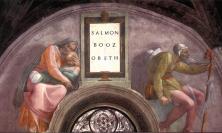The Catholic Bishops’ Conference of England and Wales have dedicated 2020 to be a year of focus on the Bible and ‘The God Who Speaks’. The prologue from John’s Gospel is read on Christmas day and famously speaks about ‘the Word’, and so we will be using these weeks of Advent, which begin the Year of the Word, to prepare to hear John’s familiar text in a new way. How do the scriptures for the Sundays of Advent invite us to a deeper engagement with what John will tell us about ‘the Word’ on Christmas day? Mark Aloysius SJ welcomes us into the divine space that exists in between the readings for the fourth Sunday of Advent, in which we meet ‘God who waits patiently for the right moment for the incarnation of the Word, and a God who hurries to give us grace.’
I.
There is a dramatic difference in Gerard Manley Hopkins’ last sketch of a waterfall in Lord Massey’s Domain, Dublin, dated 22 April 1889, in comparison with all of his earlier sketches in a book kept in the archives of Campion Hall, Oxford. In his previous sketches, Hopkins seems interested in illuminating the structure of things: strong trunks holding a tree up to the sky, the outlines of a wooded forest concealing a deep darkness within, or the soft contours of a nose on the face of a dog. Like most of Hopkins’ poems, his sketches reveal an interest in what is within and in between, a fascination at getting at the ‘dearest freshness deep down things’ (God’s Grandeur). For there in the depths of reality, Hopkins truly believed that he would find God.
But in this last sketch, drawn just a few months before he died, Hopkins etches roots, trees and water in much darker ink. There is more flurried movement and activity within the elements in the picture and the water between them. As he prepares to die, is Hopkins gripped with a fear of not being sufficiently prepared to meet the God he sought to understand all his life?
II.
Our readings this Sunday present us with two figures who are met by God and are offered a promise by God. In our first reading from the prophet Isaiah[i], we are told that God speaks directly to King Ahaz of Judah. In the midst of political anxiety, as two nations to the north (Israel and Syria) seek to wage war against Judah, Ahaz considers an alliance with Assyria, the superpower to the north. However, this alliance with a greater power portents doom for Judah.
While Ahaz is anxiously weighing his schemes in preparation for imminent war, God speaks to him, bidding him to ask for a sign. Ahaz’s reply is polite and pious: ‘I will not put the Lord to the test’. Indeed, Ahaz wants to secure his future, and the future of his people, without reference to God at all. His reply belies the faithlessness of a people who have constructed a political reality dependent on the techniques of manipulation, a kingdom completely devoid of trust in God’s care. In spite of this polite refusal, God still offers a sign of peace in the midst of war. This sign is a child born of a maiden, a child who bears the name Immanuel. Our first reading ends tragically with the complete disregard of this sign from God.
In contrast with the king who refuses God’s bidding, we are presented with Joseph[ii], a man of meagre means who responds with graciousness and generosity to God. Like Ahaz, Joseph receives divine guidance in the midst of anxiety as he considers what he might do with Mary, who is found to be pregnant just before their marriage. Unlike Ahaz who is addressed directly, Joseph meets an angel bearing God’s message in the uncertain domain of a dreamscape. But Joseph is not afflicted with the haziness of sleep, and his response upon waking is swift and decisive. God’s angel promises him the birth of the long-awaited saviour, so Joseph changes his plans and takes Mary and her unborn child into his home. In the rest of Matthew’s Gospel, we hear so very little of Joseph. The only other time that we hear of him is just before the Holy Family’s flight as refugees into exile, when Joseph places his trust unhesitatingly in God’s word, which he hears once more in a dream.
Between promise and fulfilment, there lies a long gap in time. Our readings this Sunday insert us firmly within that gap. Most of Advent we have been reminded of the virtue of patience in our waiting for God. We have been told that patience is the virtue of living without grumbling or anxiety, and that this waiting is not dead time but that something is happening within us as our faith and hope in the Lord deepens.
And yet, there is some other posture quite distinct from patience that we are invited to learn from our readings this Sunday about how we might live in this gap between promise and fulfilment. Rather than adopt a posture of polite refusal to God, of not daring to ask God for signs of God’s presence and to trust that God will indeed come to us, we are invited instead to be eager, to cultivate deep longing in our hearts for Immanuel, the God who is always with us. Polite refusals to God can only lead to dead time and withered hearts. However, eagerness for the coming of the Lord brings about decisive changes to our lives. It makes us daring and creative, willing to take risks for the sake of those placed in our care. Indeed, this eager longing is borne and nourished by God’s love.
By learning to be patient and to long eagerly, two seemingly opposing movements that our readings invite us to cultivate, our hearts learn to stretch before the mystery that is unfolding before us. We are invited to meditate on the God who waits patiently for the right moment for the incarnation of the Word. At the same time, we are also shown a God who hurries to give us grace. Perhaps only when our hearts are stretched in this manner by patience and eager longing can we hope to truly share in the divine life.
III.
Hopkins seems to intimate to us what he was trying to depict in his last sketch in an unfinished poem on waterfalls called ‘Epithalamion’, written in the same period. I leave you with his words, which make the case that it was not fear that provoked deeper and darker etchings of a waterfall. Rather, it was eager longing that guided his pen to shape words and image to depict a deeper sharing in the divine life in the movement of water between rocks and roots.
Enough now; since the sacred matter that I meanI should be wronging longer leaving it to floatUpon this only gambolling and echoing-of-earth note –What is … the delightful dene?Wedlock. What is water? Spousal love.
Mark Aloysius SJ is a Jesuit of the Malaysia-Singapore Region. He resides at Campion Hall, Oxford, where he is currently working on a doctorate on the question of desire in Hannah Arendt and Augustine. He is also a member of the editorial board of Thinking Faith.
[i] Isaiah 7:10-14
[ii] Matthew 1:18-24






